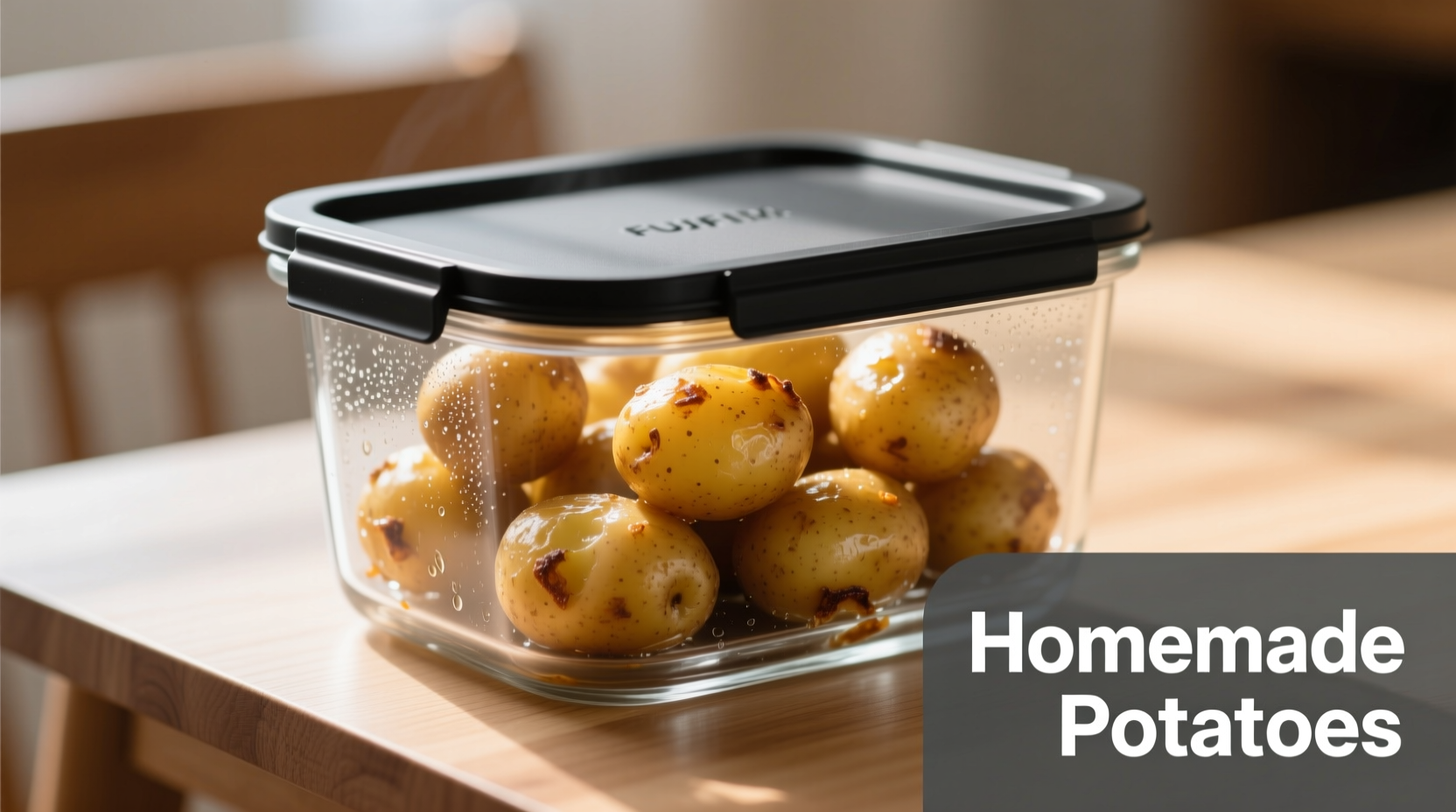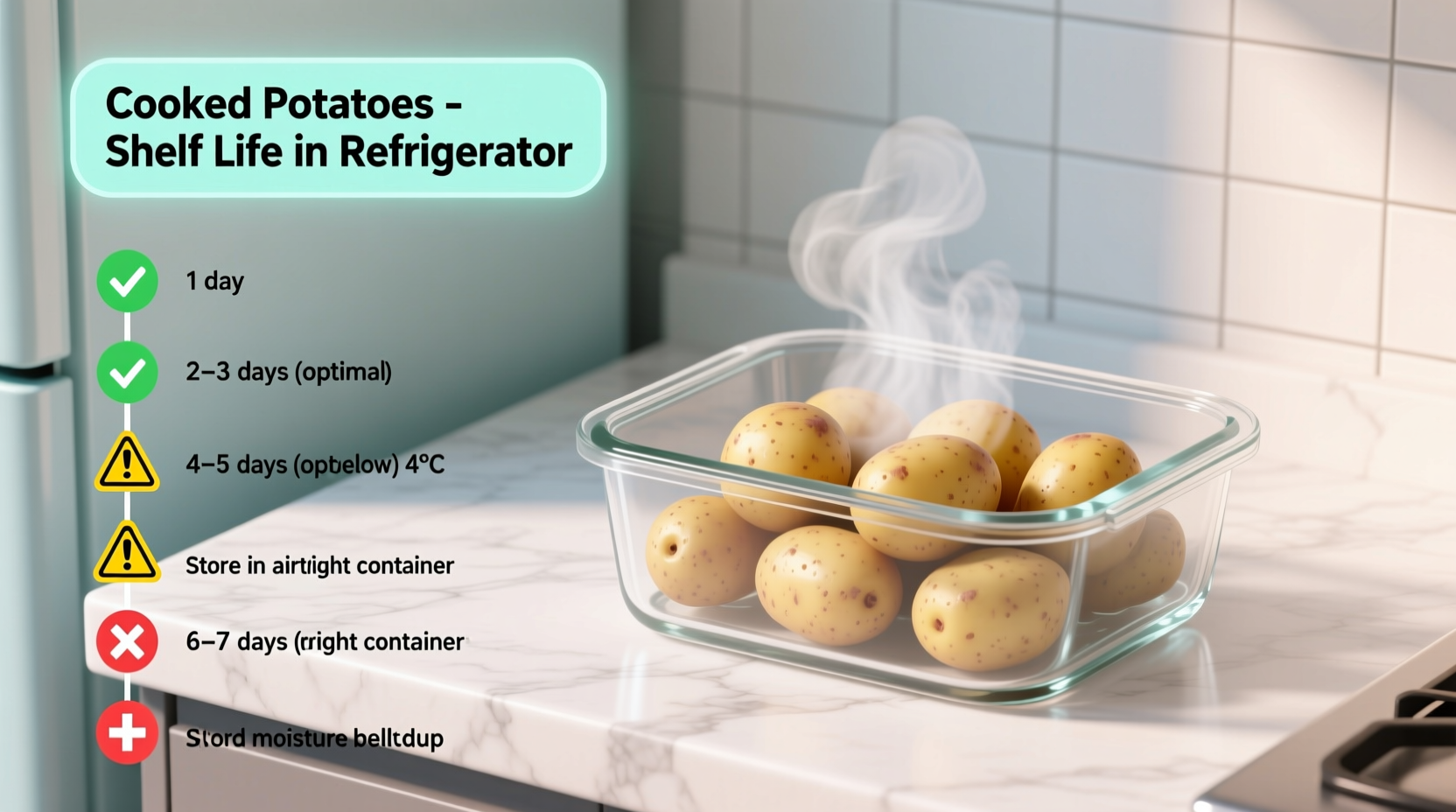Ever wonder why your perfectly cooked potatoes sometimes develop that unpleasant sour smell after just a couple of days? You're not alone. Understanding exactly how long cooked potatoes last in the fridge is crucial for both food safety and reducing kitchen waste. As someone who's spent years studying food preservation techniques, I can tell you that improper potato storage causes more foodborne illness incidents than most home cooks realize.
Why Proper Potato Storage Matters
Getting potato storage right isn't just about preventing food waste—it's a critical food safety issue. Potatoes provide an ideal environment for bacterial growth, particularly Clostridium botulinum, which causes botulism. The USDA Food Safety and Inspection Service emphasizes that cooked starches like potatoes require careful handling because they can support dangerous bacterial growth when left at room temperature.
According to the USDA Food Safety and Inspection Service, cooked potatoes left at room temperature for more than two hours enter the "danger zone" where bacteria multiply rapidly. Proper refrigeration dramatically slows this process, but doesn't stop it completely.
Storage Timeline: What Science Tells Us
The 3-5 day guideline isn't arbitrary—it's based on extensive food safety research. Here's what happens to cooked potatoes during refrigeration:
| Time Period | Microbial Activity | Quality Changes |
|---|---|---|
| 0-24 hours | Minimal bacterial growth | Optimal texture and flavor |
| 24-72 hours | Noticeable bacterial increase | Slight moisture loss, minor texture changes |
| 72-120 hours | Rapid bacterial multiplication | Significant moisture loss, potential off-flavors |
| 120+ hours | Potentially dangerous levels | Visible spoilage likely |
This timeline explains why food safety experts consistently recommend consuming cooked potatoes within 5 days. The Clemson Cooperative Extension confirms that cooked potatoes stored beyond this window show significantly increased risk of foodborne pathogens.

Maximizing Your Cooked Potatoes' Shelf Life
How you store your potatoes directly impacts their safe storage duration. Follow these science-backed methods to get the most out of your cooked potatoes:
Immediate Cooling is Critical
Don't make the common mistake of putting hot potatoes directly in the fridge. Rapid cooling prevents condensation inside containers, which creates excess moisture that accelerates spoilage. Spread cooked potatoes in a single layer on a baking sheet and let them cool to room temperature within two hours before refrigerating.
Airtight Containers Make the Difference
Glass containers with tight-fitting lids outperform plastic containers for potato storage. The USDA recommends removing as much air as possible from storage containers to limit bacterial growth. For mashed potatoes, press plastic wrap directly onto the surface before sealing the container to prevent oxidation.
Temperature Consistency Matters
Your refrigerator should maintain a consistent temperature of 40°F (4°C) or below. Use an appliance thermometer to verify your fridge's actual temperature—many home refrigerators run warmer than their settings suggest. Store potatoes on interior shelves rather than the door, where temperature fluctuates most.
Spoilage Warning Signs You Can't Ignore
Even within the 3-5 day window, improperly stored potatoes can spoil prematurely. Watch for these critical indicators that your cooked potatoes have gone bad:
- Visual changes: Grayish discoloration, mold growth (white, green, or black spots)
- Texture issues: Slimy surface or mushy consistency
- Odor problems: Sour, unpleasant, or "off" smell
- Taste warning: Any unusual or bitter flavor (though you shouldn't taste suspicious food)
The USDA Food Safety and Inspection Service states clearly: "When in doubt, throw it out." Never attempt to salvage part of spoiled potatoes—bacteria and their toxins can spread throughout the entire dish.
Freezing: Extending Your Potato Storage Timeline
If you need to store cooked potatoes longer than 5 days, freezing is your best option. Properly frozen cooked potatoes maintain quality for 10-12 months:
- Cool potatoes completely (follow the two-hour rule)
- Spread on baking sheet and flash-freeze for 1-2 hours
- Transfer to airtight freezer bags, removing as much air as possible
- Label with date and contents
- Store at 0°F (-18°C) or below
When reheating frozen potatoes, thaw in the refrigerator overnight or use the microwave's defrost setting. Never refreeze previously frozen cooked potatoes.
Special Storage Considerations
Certain potato preparations require special attention:
- Potato salad: Contains mayonnaise which spoils faster—consume within 3-4 days
- Mashed potatoes: Higher moisture content reduces shelf life—best within 3-4 days
- Roasted potatoes: Crispy exteriors become soggy faster—store with paper towel to absorb moisture
- Potatoes with dairy: Dishes containing milk, butter, or cheese have shorter shelf life—consume within 3-4 days
The FDA Food Code specifies that cooked potentially hazardous foods containing dairy should be treated with extra caution due to accelerated bacterial growth. When storing potato dishes with dairy components, always follow the shortest recommended timeframe.
Common Storage Mistakes to Avoid
Even with the right timeframe knowledge, these common errors can shorten your potatoes' safe storage period:
- Leaving cooked potatoes at room temperature overnight
- Storing in non-airtight containers that allow moisture buildup
- Putting hot potatoes directly into the refrigerator
- Storing near strong-smelling foods that can affect flavor
- Using containers that previously held strong-smelling foods
Remember that food safety guidelines assume proper initial cooking. Undercooked potatoes may harbor more bacteria initially, reducing their safe storage window. Always cook potatoes to an internal temperature of 210°F (99°C) for optimal safety.











 浙公网安备
33010002000092号
浙公网安备
33010002000092号 浙B2-20120091-4
浙B2-20120091-4